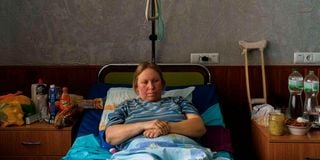UNFPA appeals for funds to help women displaced in Ukraine

A wounded woman lies in her hospital bed in Zaporizhzhya, Ukraine, on March 29 amid Russian invasion of the country.
What you need to know:
- The war continues to cause untold suffering, destruction and displacement, with the ensuing mayhem taking a disproportionate toll on women and girls.
- At the start of the war, an estimated 265,000 women were pregnant in Ukraine, with 80,000 expected to give birth in the coming few months.
Two months after Russia invaded Ukraine, more than 10 million people have been displaced, with 90 percent of them being women and girls.
The war continues to cause untold suffering, destruction and displacement, with the ensuing mayhem taking a disproportionate toll on women and girls.
At the start of the war, an estimated 265,000 women were pregnant in Ukraine, with 80,000 expected to give birth in the coming few months. These numbers are expected to increase significantly as the offensive continues.
Heartbreaking attacks on hospitals and health infrastructure continue to be reported, with women giving birth in basements and bomb shelters without adequate medical support.
It is for these reasons that the United Nation Population Fund (UNFPA) has embarked on a global fund appeal to raise money to support women and girls affected by the ongoing conflict.
The combined funding needed is $65.65 million: $47.75 million for Ukraine; $15.7 million for Moldova; and $2.2 million for other neighbouring countries. The support will run until the year end.
Lifesaving response
The UN agency seeking donations from well-wishers across the globe to bolster lifesaving sexual and reproductive health services, and protection and response services for survivors of physical and sexual violence.
UNFPA, together with partners, will use the money collected for sexual and reproductive health (SRH), including maternal and newborn health; and protect women and girls from sexual and gender-based violence (SGBV).
Dr Natalia Kanem, executive director of UNFPA, in a press statement said women and girls affected by the war face ongoing threats to their health and safety, and their needs must be prioritised.
“Women do not stop getting pregnant or giving birth during conflict, and their access to lifesaving health services is literally under attack in Ukraine. With health and social service facilities being bombed and shelled, and reports of rape and other forms of gender-based violence rising, UNFPA is focused on meeting the distinct needs of women and girls,” said Dr Kanem.
Critical supplies
Already, more than 13 tonnes of reproductive health supplies have been delivered to seven hospitals in Dnipro, Kharkiv, Kyiv, and Zaporizhzhya.
An additional 27 tonnes of critical reproductive health supplies, medicines and equipment have arrived in Ukraine and will be distributed to maternity hospitals in war-torn Chernihiv, Sumy, Kherson, Mykolaiv and four more cities to meet the needs of 1.5 million people.
Another 41 tonnes of reproductive health supplies are scheduled to arrive in Ukraine later this month.
UNFPA is also distributing dignity kits, comprising sanitary pads and other essential items, to support women’s hygiene. It is also supporting 30 shelters, crisis rooms and daily care centres for displaced women and survivors of violence.
In the neighbouring Moldova, host to some 100,000 refugees that are staying in the country, UNFPA has signed an agreement with the National Health Insurance Company to guarantee refugees, including women who are pregnant or have given birth, access to comprehensive sexual and reproductive healthcare.
The agreement also includes the provision of critical maternal health services, such as caesarean sections to save the lives of women and newborns.
Emergencies
The organisation recently delivered 10 tonnes of reproductive health supplies to Moldova, including for the management of obstetric emergencies, to hospitals and 41 youth-friendly health centres and to every district of the country.
UN Secretary-General Antonio Guterres last month called for an end to the "absurd war" started by Russia's invasion of Ukraine in February.
UN Women Executive Director Sima Bahous last month demanded an urgent gender-intentional response to prioritise the specific rights and needs of women and girls.
Ms Bahous said they were making efforts to address women’s priority needs, specifically safety; access to shelters; necessities such as food, medicine, and hygiene products, accommodation, water; and access to power.





